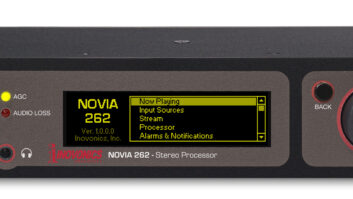
New NAB President/CEO Curtis LeGeyt, appearing at The Media Institute’s Communications Forum, laid out four areas of policy that the association considers priorities — “where policymakers must focus to ensure broadcasters can compete and thrive in the current media environment.”
He said Congress should act to rein in what he called “the gatekeeping ability of the Big Tech giants who are stifling the economics of local news.” NAB supports passage of the Journalism Competition and Preservation Act, which he said would allow stations to jointly negotiate the terms and conditions for their local content when it is accessed through the large tech platforms. “There is simply too much at stake if we don’t confront Big Tech’s online dominance.”
[See Our Business and Law Page]
Second, he said, lawmakers and regulators must modernize media ownership laws to reflect the realities of the marketplace. “A report released last Congress by Senate Commerce Chair Maria Cantwell noted that Google and Facebook control an estimated 77 percent of locally-focused digital advertising. Yet broadcasters still operate under a set of rules that pretend they only compete with one another,” he said.
LeGeyt said Congress and the FCC “must take a fresh look at whether these decades-old regulations are helping or impeding broadcast competition and media diversity.”
Third, he urged the FCC to reorient how it thinks about broadcast policy more broadly.
“It is imperative that the FCC recognize that the broadcast industry’s ability to function in the public interest is fundamentally premised on its economic viability,” he said. “This means the commission must consider whether each existing and new regulation will help or impede broadcasters’ ability to thrive in a media environment dominated by other platforms. It means embracing the tremendous consumer benefits of ATSC 3.0 and adopting policies that enable its growth. And it means the FCC working hand-in-hand with broadcasters, to help us attract leading talent from all backgrounds to ensure our stations better reflect the diversity of the communities we serve … But if broadcast regulatory reforms remain bogged down in all that could go wrong instead of all that could go right, we will not succeed.
And he urged support for the Local Radio Freedom Act, opposing a performance fee on local radio stations that he said would be “financially devastating” to broadcasters and hurt their listeners.












